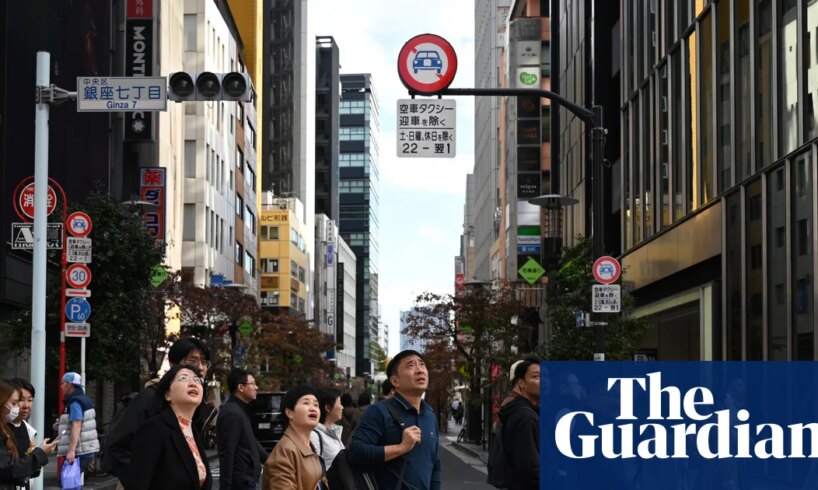
Shares in Japanese tourism and retail firms have fallen sharply after China warned its citizens not to travel to Japan, while a senior Japanese diplomat was due to travel to Beijing amid an escalating row over comments about Taiwan made by the Japanese prime minister, Sanae Takaichi.
Relations between the two countries have deteriorated dramatically in the past week after Takaichi, a conservative who has hawkish views on China, suggested that Japanese self-defence forces could intervene if a Chinese attempt to invade Taiwan represented a “survival-threatening situation” for Japan.
The comments – a reflection of the views of politicians on the right of Takaichi’s Liberal Democratic party – triggered a furious response from Beijing, including calls for Chinese citizens to boycott Japan as a tourist destination, and a coastguard sail-by through the disputed Senkaku islands at the weekend.
In an attempt to prevent tensions from escalating, Masaaki Kanai, the director general of the Japanese foreign ministry’s Asia and Oceania bureau, will meet his Chinese counterpart, Liu Jinsong, on Tuesday, Japanese media reported.
Kanai is expected to reassure Liu that Takaichi’s comments do not signal a shift in Japanese security policy, and to urge China to refrain from actions that could damage bilateral ties.
The call by Beijing for Chinese travellers to avoid Japan – which was followed by advice that students reconsider taking up places at Japanese universities – is already affecting businesses.
In morning trade on Monday, shares in the Japanese cosmetics firm Shiseido fell 9%, in department store group Takashimaya by more than 5% and in Fast Retailing – the owner of the Uniqlo clothing brand – by more than 4%.
China is the biggest source of tourism to Japan, with Chinese travellers known for spending large sums on cosmetics, clothes and consumer electronics.
On Monday, the Chinese cinema releases of two Japanese animations were postponed indefinitely. State media suggested the delays were also part of China’s countermeasures.
Takaichi told Japan’s parliament on 7 November that the use of force against self-ruled Taiwan, which is claimed by China, could warrant a military response from Tokyo.
If a Taiwan emergency entails “battleships and the use of force, then that could constitute a situation threatening the survival [of Japan], any way you slice it,” she said.
Japan’s self-imposed rules say that it can act militarily only under certain conditions, including an existential threat, and the government has since said its position on Taiwan – which lies 100km from the nearest Japanese island – is unchanged.
Under a joint communique in 1972 that normalised bilateral relations, Japan “fully understands and respects” China’s stand that “Taiwan is an inalienable part of the territory of the People’s Republic of China”.
Before taking office last month, Takaichi, an ally of the conservative former prime minister Shinzo Abe, who was assassinated in 2022, was a vocal critic of China and its military buildup in the Asia-Pacific.
Her comments came days after she met the Chinese leader, Xi Jinping, for an apparently cordial first meeting on the sidelines of an Apec summit in South Korea.
Taiwan’s presidential office has described Takaichi as a “staunch friend” of the island. She has visited Taiwan and called for closer cooperation, and also met Taipei’s representative at the Apec summit.
China and Japan last week summoned each other’s ambassadors, with Beijing then advising its citizens to avoid travelling to Japan.
On Sunday, the Chinese coastguard said its ships made a “rights enforcement patrol” through the waters of the Senkaku islands, which are administered by Japan but also claimed by China as the Diaoyu islands.
Beijing insists Taiwan, which Japan occupied for decades until 1945, is part of its territory and has not ruled out the use of force to seize control.
China and Japan are key trading partners, but historical mistrust and friction over territorial rivalries and military spending often test those ties.
With Agence France-Presse




